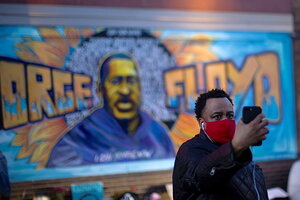Manifold justice for George Floyd
Reactions to the murder verdict of a former Minneapolis police officer reflect a United States digging deeper for all the aspects of justice coming out of this tragedy.

A resident in Minneapolis takes a selfie in front of a mural of George Floyd after the verdict in the trial of former Minneapolis police officer Derek Chauvin.
Reuters
Many Americans, especially those of African descent, have long looked to the justice system for affirmation that the ideal of equal treatment before the law extended to them. That affirmation came in part with the April 20 conviction of a former Minneapolis police officer for the killing of a Black man. Yet any joy on that point has been muted by calls to see justice in all its different aspects, from retribution to mercy.
A good example was the reaction of Minnesota Attorney General Keith Ellison. “Since the investigation and prosecution of this case began last May, everyone involved has pursued one goal: justice,” he said. “I would not call today’s verdict justice, however, because justice implies true restoration. But it is accountability.”
Besides the kind of justice that restores – or heals – relationships between people, civil rights veteran the Rev. Al Sharpton suggested after the verdict that justice should even extend to preventing such police killings: “We don’t find pleasure in this. We don’t celebrate a man going to jail.”
These comments reflect a country digging deeper than ever for the values-laden underpinnings of an often-marred American system of justice.
The trial itself reflected this public desire for greater understanding of justice. For one, it was televised, a rarity in Minnesota. The jury was very racially mixed and worked quickly together to reach a verdict. And two top Minneapolis police officers spoke against the excessive use of force by Derek Chauvin, breaking the “blue wall of silence” that often hides police abuse.
Mr. Chauvin himself showed no remorse, although his sentencing in about eight weeks will provide an opportunity for the family and friends of his victim, George Floyd, to speak directly to him. Perhaps then another aspect of justice might emerge – the potential to offer healing components beyond the punitive if Mr. Chauvin acknowledges his crime and its impact, accepts the grief and any forgiveness offered by the Floyd family. Rebuilding the broken bonds in our society is the more daunting task, but the most needed.
Since the killing last May, much of U.S. society has moved toward a consensus on ways to prevent police brutality. State legislatures have introduced more than 1,000 police reform bills and resolutions. More than 200 cities and towns now have citizen advisory boards to monitor police conduct. A federal police reform bill in Mr. Floyd’s name passed the House and awaits action in the Senate. U.S. Attorney General Merrick Garland has launched a civil investigation into the constitutionality of the use of force by the Minneapolis Police Department.
To fulfill the promise of justice for all, said Vice President Kamala Harris after the verdict, is “not just a Black America problem or a people-of-color problem. It is a problem for every American. ... And it is holding our nation back from realizing our full potential.”
On many levels, this trial set a high standard for future cases of police abuse. Its more useful lesson is that justice is more than a fair verdict of guilt and a deserved prison sentence. Along the way, less punitive aspects of justice are not only possible but also necessary.

